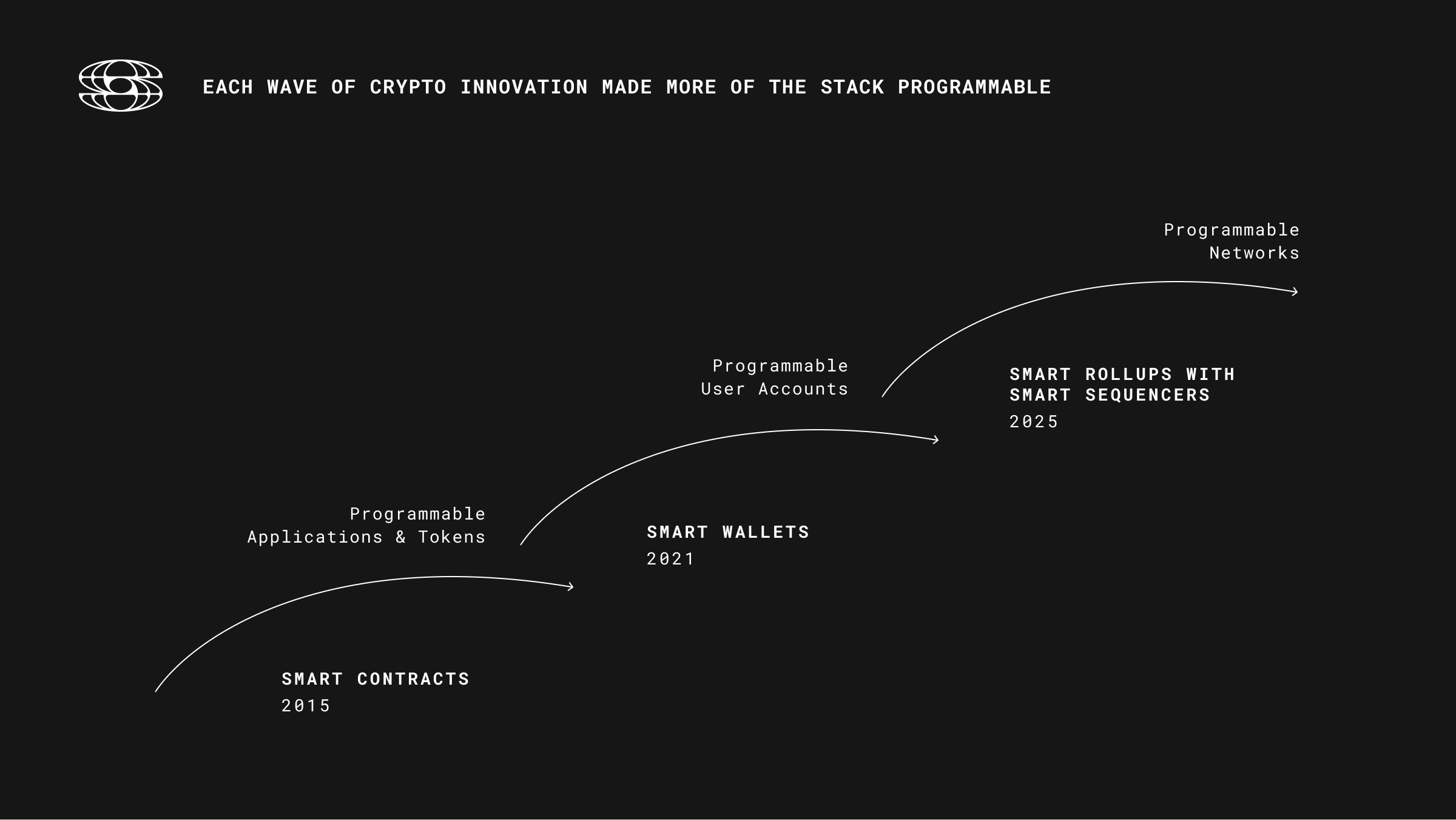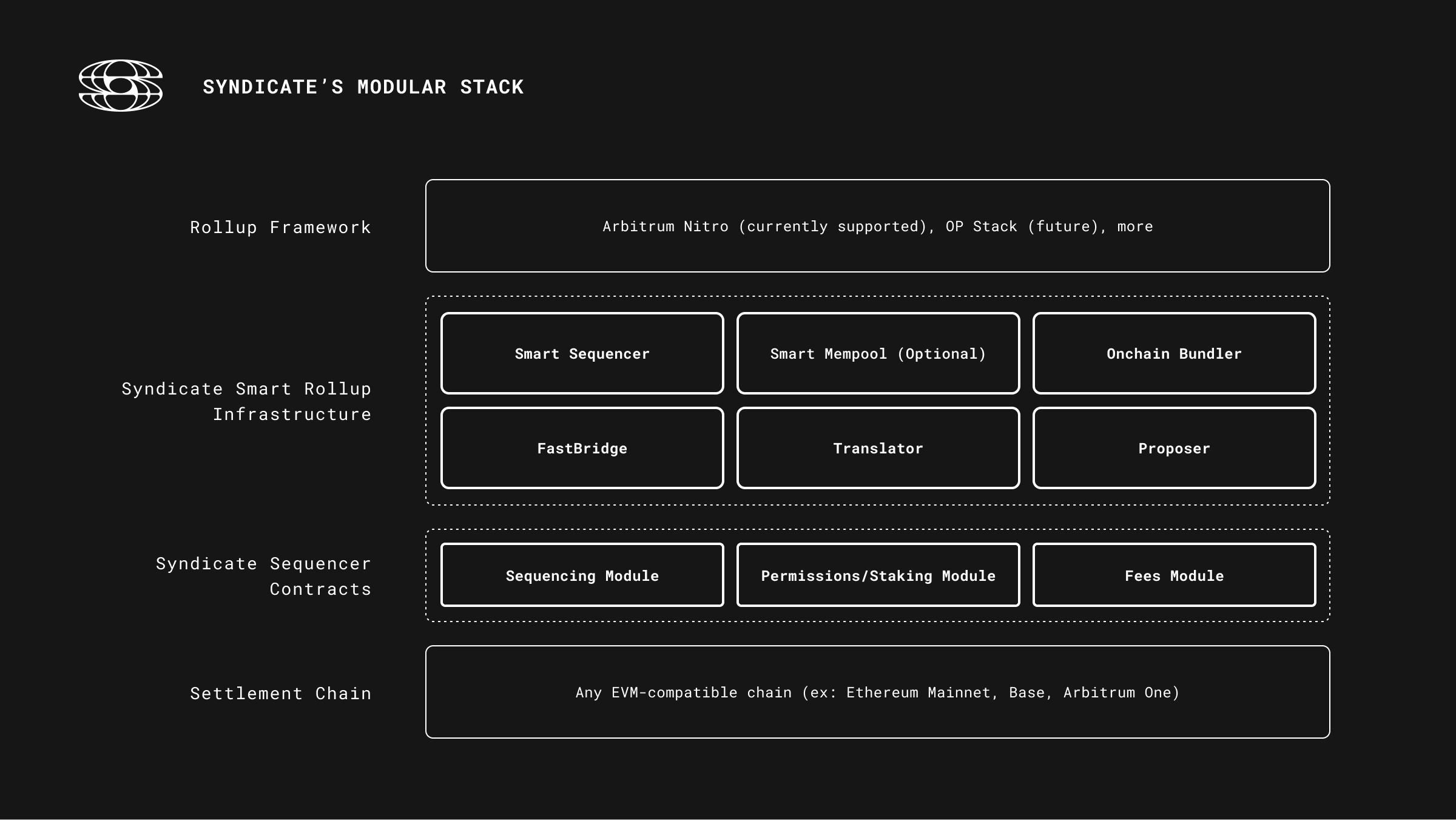Introducing Smart Rollups with Smart Sequencers
First there were smart contracts. Then smart wallets. Now, Syndicate is making networks themselves programmable with Smart Rollups with Smart Sequencers—enabling developers and their tokenized communities to verifiably own, control, and evolve their networks through code.

Today, Syndicate is introducing Smart Rollups with Smart Sequencers––the next major leap forward in crypto infrastructure.
First there were smart contracts. Then smart wallets. Now, Syndicate is making networks themselves programmable with Smart Rollups with Smart Sequencers—enabling developers and their tokenized communities to verifiably own, control, and evolve their networks through code.
Join our community, reach out, or get started at docs.syndicate.io today.
From Smart Contracts to Smart Networks
Each major wave of crypto innovation has advanced by making more of the stack programmable. First came smart contracts, then smart wallets. Smart Rollups with Smart Sequencers are the next major leap forward.

Smart Rollups with Smart Sequencers bring programmability all the way down to the network level—the layer that decides how transactions are ordered, fees are handled, updates are made, and more. Until now, this layer has been hardcoded, offchain, and out of the hands of the developers and communities building on it. Smart Rollups with Smart Sequencers change this.
By bringing this logic onchain, Smart Rollups with Smart Sequencers gives developers and their communities full power over how their networks run—and the ability to evolve those rules over time without gatekeepers. It’s the same transformation smart contracts brought to protocols, now applied to the networks themselves.
Syndicate Smart Rollups with Smart Sequencers
Traditionally, rollups and their sequencers are centralized, offchain services run by a single provider or a small validator set. If the provider fails or changes its terms, the network and community are at its mercy.
Syndicate Smart Rollups are powered by fully programmable, smart contract-based Smart Sequencers—giving developers and their tokenized communities full ownership and control over their sequencer, network, and economy.

With Syndicate Smart Sequencers, developers can define custom transaction ordering logic—FIFO, fee-based, auctions, randomized, proof-of-event—directly into their smart contracts. Governance can be evolved to be open, closed, DAO-run, or stake-weighted. Fee flows and MEV policies are fully programmable: burn them, redistribute them, route them to a treasury, or subsidize targeted activities.
Since Syndicate Smart Sequencers are entirely onchain, they unlock capabilities no offchain system can match:
- Easy customization of transaction ordering rules: Easily customize and differentiate your network through simple smart contract module upgrades. Reduce time to market and cost by 100x.
- Custom economic models: Design custom economic mechanisms through transaction inclusion, ordering, permissioning, and fee structures that align value/MEV with your community.
- Enshrine protocols directly into the sequencer and network: Oracles, VRFs, marketplaces, and other critical logic can run inside the sequencer itself—reducing latency, boosting reliability, and aligning incentives with the network.
- Permanent, verifiable data by default: All transaction and ordering data is stored onchain, not in expiring blobs or centralized servers. Historical state, contract logic, and user activity remain accessible, verifiable, and resilient–– permanently.
- Atomic cross-chain composability: Atomically compose multiple Syndicate Smart Rollups by including transactions in the same block through simple atomic composability smart contract modules.
- 10-100x lower cost to launch and scale: Run rollups at a fraction of the cost of a centralized provider by moving sequencing and data onchain, reducing overhead by 10x-100x through fewer nodes. All of this logic—sequencing rules, governance, fee flows—lives in upgradable smart contract modules, so rules can evolve without rebuilding infrastructure or hard-forking the chain.
- Progressively decentralize to community: Progressively open control and ownership of the network to your tokenized community by easily updating to the sequencer's permissioning module—even programmatically through tokenized governance.
Syndicate Smart Rollups work with any supported rollup framework and settlement layer. We currently support Arbitrum Orbit, with OP Stack and other non-EVM frameworks planned. For settlement, you can choose Ethereum L1, Base, Arbitrum, or any other EVM-compatible chain.
This architecture gives developers maximum flexibility with the superpowers of Syndicate Smart Sequencers when building a network.
Syndicate’s Modular Stack
The Syndicate Stack is modular, with each component playing a specific role:

- Syndicate Smart Sequencer: Collects transactions and submits them to onchain sequencer smart contracts according to your custom logic.
- Syndicate Smart Mempool (optional): Collects and batches transactions before sequencing. Skip it for maximum decentralization or transaction privacy.
- Syndicate Onchain Bundler: Pairs user transactions with sequencer-injected transactions— that involve data such as VRF or oracle updates—and enforces that they must be sequenced together.
- Syndicate Sequencer Contracts: Sequencer smart contracts hosted on Syndicate Network, giving each rollup full control over ordering, permissions, and economics through simple smart contract module updates.
- Syndicate Translator: Integrates Syndicate Network and the settlement chain, converting high-level sequencing decisions into a format that can be processed by the execution environment.
- Syndicate FastBridge: Offers 10 minute withdrawals via TEEs. TEE attestations are verified onchain via zkVM proofs.
- Syndicate Proposer: Commits state changes to your settlement chain for finality and bridging.
- Rollup Framework: Your chosen execution layer (currently support Arbitrum Nitro) where transactions are processed and state is updated.
- Settlement Chain: The underlying network providing security and finality (Ethereum L1, Base, Arbitrum One, etc.).
Together, these components transform sequencers from a centralized bottleneck into a programmable, community-owned layer. Learn more at docs.syndicate.io
Building a Community-Owned Internet, Together
The ability to design and govern your own network—from sequencing to economics—has never been possible without giving up control. Syndicate Smart Rollups with Smart Sequencers remove that tradeoff.
Smart Rollups with Smart Sequencers are the foundation of a community-owned internet: networks run by the people who build and use them—where value flows back to the community and rules evolve without centralized gatekeepers.
Join us and many teams already building a community-owned internet with Smart Rollups with Smart Sequencers today.